Obviously I can't argue with success, and I'm happy it's working, but I'd be willing to bet there was something else going on. That fuse link wire is meant to be the weak link in the chain, and a 12 gauge wire is the correct size on a vehicle with a smaller generator and smaller wiring. Your generator won't produce any more current than the vehicle needs. In fact, you'd never know the difference if you had a 90 amp generator instead of perhaps a 120 amp unit except for the very few instances when you really need more current.
In my electrical classes I often compared electrical current flow to water flowing in a pipe or river. In effect, what you had was a smaller diameter pipe. That would cause the resistance you mentioned, but if you only needed a little water flow, the diameter of that smaller pipe would have no affect on on flow. You'd still have something, not nothing.
The exception would be if you tried to do a full-field load test on the charging system. If you drew the maximum current the generator could deliver for say 10 or 15 seconds, it could be possible to burn the fuse link open, but under normal conditions the smaller wire wouldn't cause a problem. The entire wire from the generator to the battery is likely to have two or three ohms of resistance anyway, and the smaller link would add less than 0.1 ohm to that total.
My other concern is you said the problem was intermittent before, and it worked for a while with the smaller fuse link. I hope it stays working, but if not, holler back and we'll dig into it further.
Tuesday, May 20th, 2014 AT 7:46 PM


